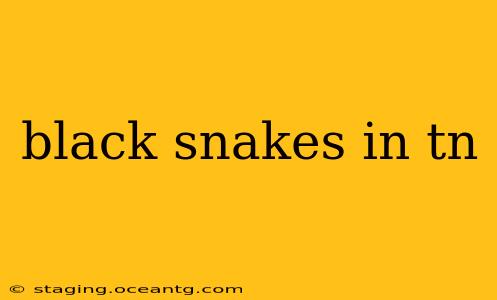Tennessee is home to a variety of snakes, and several species boast black coloration, either entirely or partially. Understanding which black snake you've encountered is crucial, especially concerning venomous species. This guide will help you identify common black snakes in Tennessee and address some frequently asked questions.
What are the types of black snakes in Tennessee?
Several snake species in Tennessee exhibit black or predominantly black coloration. These include:
-
Black Rat Snake ( Pantherophis obsoletus): This is the most likely candidate if you see a large, black snake in Tennessee. They are non-venomous and highly beneficial, controlling rodent populations. While typically gray or brown, melanistic (all-black) variations are common. They can reach significant lengths (up to 7 feet!).
-
Eastern Black Racer (Coluber constrictor): These snakes are also non-venomous and slender, with a glossy black appearance. They are fast-moving and known for their aggressive defense displays (though they rarely bite humans).
-
Pilot Black Snake (Elaphe obsoleta): Sometimes confused with the Black Rat Snake, pilot black snakes are generally larger and are a subspecies of the black rat snake. Differentiating these two takes a keen eye and frequently requires examining their scale patterns up close.
It's important to note that while these snakes are predominantly black, some individuals may show hints of other colors, especially as juveniles.
What is the difference between a black rat snake and a black racer?
While both are black and non-venomous, there are key differences:
- Size: Black rat snakes are generally larger and heavier-bodied than black racers.
- Head shape: Black rat snakes have a more rounded head, while black racers have a slightly more elongated, pointed head.
- Behavior: Black racers are faster and more agile than black rat snakes and are more likely to flee when approached. Black rat snakes are more likely to freeze or attempt to hide.
- Pattern: While both can be melanistic, younger individuals might display some pattern. The pattern differs between species.
Are black snakes in Tennessee venomous?
No, the common black snakes in Tennessee mentioned above are not venomous. However, confusing a black rat snake or racer with a venomous snake like a black phase timber rattlesnake or a copperhead is possible. If you are unsure, it is best to maintain a safe distance and avoid handling any wild snakes.
How can I identify a black snake in Tennessee?
Accurate identification requires careful observation. Consider these factors:
- Size and Body Shape: Note the snake's overall length, body thickness, and head shape.
- Color and Pattern: While mostly black, look for subtle variations or patterns, especially on younger snakes.
- Location: Where did you see the snake? Habitat can provide clues about the species.
- Behavior: How did the snake react to your presence? Did it flee, freeze, or display defensive behavior?
What should I do if I see a black snake in my yard?
Most black snakes are beneficial to have around as they help control rodent populations. If you're uncomfortable, gently encourage it to leave by creating a safe escape route. Avoid attempting to catch or handle it. If you encounter a snake you suspect is venomous, contact your local animal control or wildlife removal service.
What is the most common black snake in Tennessee?
The black rat snake is likely the most commonly encountered black snake in Tennessee. Its widespread distribution and prevalence of melanistic morphs contribute to this.
This guide provides general information. For definitive identification, it's recommended to consult a field guide to Tennessee snakes or a herpetologist. Remember, appreciating these creatures from a safe distance is always the best approach to peaceful coexistence.
